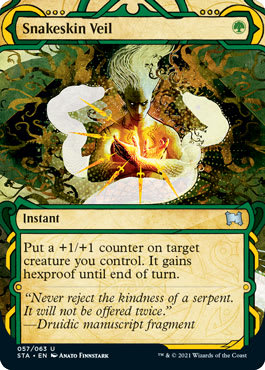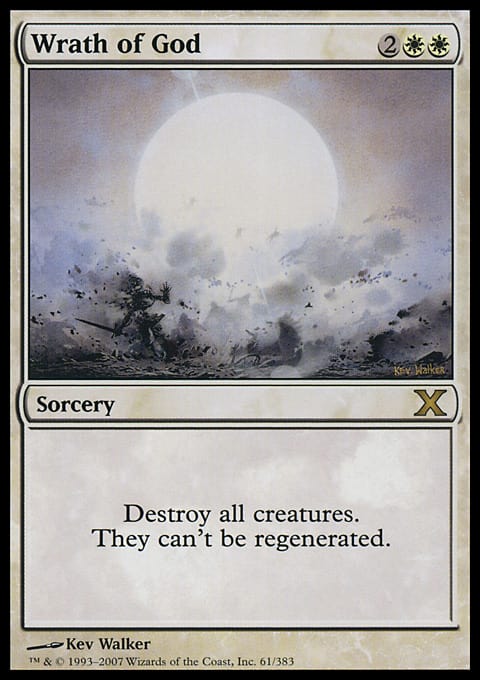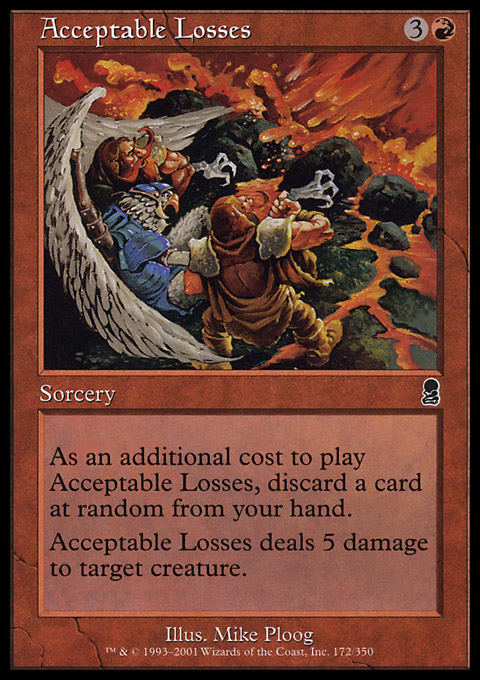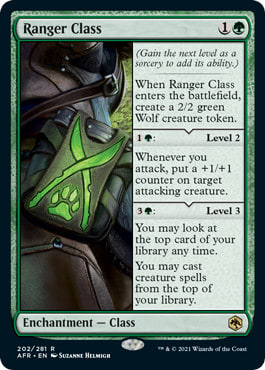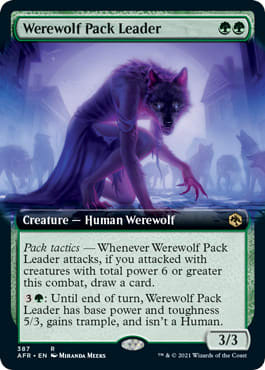Magic players have this problem.
They really, really like to feel smart.
A lot of the time this is a good thing! Magic is a complicated game that requires a lot of intense planning and deductive reasoning; frankly, Magic players are smart. However, there's a distinct difference between being smart and feeling smart.
We see this in gameplay often, as players will often prioritize either trying to "get" their opponent, or the converse of not trying to get "got" by their opponent.
Maybe it's trying to get them to play into a soft counterspell.
Maybe it's a well-timed combat trick.
Maybe it's inducing your opponent to overextend into a sweeper.
But the end result is having the opponent walk into your carefully laid trap to gain a huge advantage in game. This can often be a game swinging play, while also having the psychological advantage of your opponent knowing they've been duped. Frankly it feels good to pull off a play like this and bad when you walk into one.
The problem is when a player prioritizes this tricky subgame over the actual goal of trying to win the game.
It's a very subtle, very common mistake that players of all levels make, including the very best in the game, as sometimes it's easy to forget that your goal in a game of Magic is to win the game, not just to feel smart by tricking your opponent. This goes both ways as well, as players will often prioritize not getting tricked over making the best play.
Today I am going to go over three reasonably simple examples of this to help illustrate how you can identify these spots in your own games and make sure you are thinking about them with the big picture in mind.
Scenario One - The Combat Trick
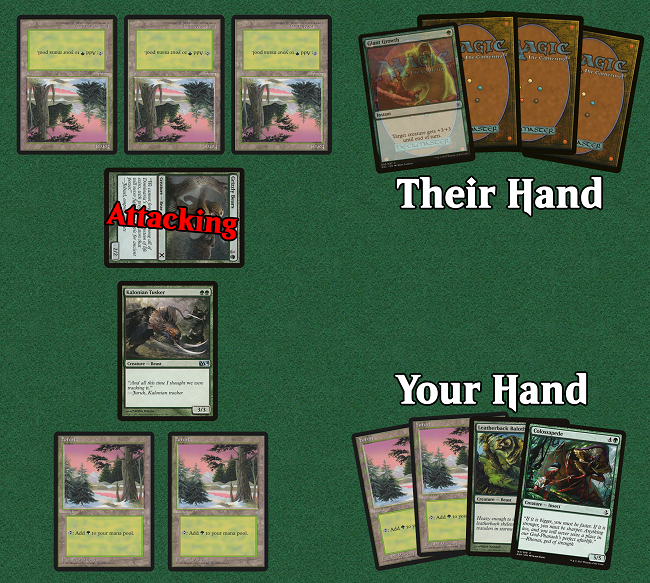
Ah yes, one of the most classic spots in Magic, the combat trick/bluff attack.
In this simple scenario, it is your opponent's turn and they've just played their third land and then sent their 2/2 Grizzly Bears in for an attack. You have a 3/3 Kalonian Tusker on defense, which means that by attacking your opponent is representing some sort of trick. This is an extremely common scenario in Limited, but can come up in Constructed as well, and in this example I'm using all vanilla creatures to keep it simple.
The question is, do you block?
Let's look at this from the different levels of reasoning.
Level 0 - Yes, I should block because my creature is bigger than theirs
This is the base level reasoning you'd expect from someone who is just learning the game. They understand how the pieces work and that this would be a good move for them to make. However, I doubt anyone reading this is at this level, so we can move up one level.
Level 1 - No, I shouldn't block because my opponent wouldn't make this attack without a trick
This is where your average Magic player is at. It's not too hard to deduce that unless your opponent doesn't grasp the rules, they wouldn't make a move like this without something to back it up. There is of course the possibility that your opponent is bluffing, but that happens pretty infrequently and there are more important factors to consider.
Level 2 - Yes, I should block because even if they have a trick it helps to further my game plan
This is the level you want to be on, as it's the level that expands the scenario from beyond just the cards Grizzly Bear, Kalonian Tusker, and Giant Growth to the macro scope of the entire game. It's not enough to just consider this combat step, but instead how it is going to effect the next few turns of the game.
By blocking, two very important things happen.
The first is that your opponent has to actually use their Giant Growth to win the combat. This means that they end up trading one card, Giant Growth, for your one card, Kalonian Tusker. You lose a mana on the exchange, but more important is how this effects your opponent's development. Because they spent a mana on Giant Growth, they are no longer able to play a 3-drop this turn, which restricts their ability to add to the board. If they don't have another 2-drop or something else to use their mana on here this is a huge win for you tempo-wise as Giant Growth may have well have cost three mana.
The second is that while you've lost your Kalonian Tusker to their Giant Growth, you've now paved the way for your even better future creatures to dominate the board. If you hadn't blocked and then next turn deployed your 4/5 Leatherback Baloth, what are you going to do when they once again attack with their 2/2 and represent Giant Growth? By allowing them to "get" you on your Kalonian Tusker, you're setting your future turns up even better.
Your goal in a game of Magic is not to win every combat step, your goal is to win the game of Magic. Sometimes this means losing the battle to win the war.
(And some small percentage of the time they will just be bluffing and you get to experience the joy of watching them sheepishly put their creature in the graveyard.)
Scenario Two - The Soft Counter

Nobody likes being hit with a soft counter and "counter target spell unless it's controller pays 1" is as soft as they come. There's a reason why Mana Tithe and Force Spike are such beloved cards, because it just feels awesome to tap one and shout "GET OFF MY PLANE!" as you counter their critical card with your crappy counterspell.
What makes cards like Mana Tithe and Jwari Disruption // Jwari Ruins invoke this feeling is that they are much easier to play around than a hard counter or even something like Mana Leak. All you need is one extra mana and you can completely nullify their card as long as you are careful.
Which brings us to scenario two, turn two of a Standard game of Mono-Green Aggro against Izzet Dragons.
You've just played your second land, a Snow-Covered Forest, and need to decide what to do.
The question is, do you cast Werewolf Pack Leader?
Let's break our response into the different levels of thinking.
Level 0 - Yes, I should play my 2-drop because I want to play my creatures and kill them fast
Again, we see the base level reasoning of someone who is just understanding the basics of the game. You're playing a creature beatdown deck and you want to use all of your mana every turn and play your best card possible to kill them quickly.
Level 1 - No, I should wait because Jwari Disruption // Jwari Ruins is a commonly played card and I don't want to lose my premium 2-drop
Once again, level one is where most Magic players are at; this level requires a good amount of knowledge about the cards commonly played in the format as well as the relative value of the cards in your own deck. Werewolf Pack Leader is definitely the best 2-drop in the deck and you don't want to lose it to their soft counter.
Level 2 - Yes, I should play Werewolf Pack Leader because I have my best possible curve and they won't have it for next turn
Level two takes a step back from the small picture of just this turn two and into the larger picture of how this game is likely to play out. There are only two other spells in your hand, your best 3-drop and your best 4-drop. As such you really want to cast them on curve, but if you wait this turn and want to commit to playing around Jwari Disruption every turn thereafter, you are essentially giving your opponent a free Time Walk without them needing to actually do anything.
In this case you are happy to trade your Werewolf Pack Leader with their Jwari Disruption // Jwari Ruins because of how it sets up your next two turns. Furthermore, it is extremely important to make sure you get on the board fast in the matchup, because you can't match the game ending power of Goldspan Dragon and Alrund's Epiphany.
And of course, there's also just a chance they don't have it.
You may think that they have the Jwari Disruption // Jwari Ruins, but there's not a huge amount of information leading you that way based on how few things have happened in the early stages of this game. If they don't have it, not casting Werewolf Pack Leader would be a catastrophic mistake, far worse than getting it countered if they do.
It's important to note that the math here completely changes if your hand is something like this:
Now you have more options than just slamming Werewolf Pack Leader, as well as no big 3- and 4-drops to play into. Instead, you'd likely want to hedge and lead with your worst 2-drop to still add to the board but not get hit as hard by the Jwari Disruption // Jwari Ruins.
It's all about how you think the first few turns are going to play out; your goal is to plan out how your next few turns are going to go and play accordingly, even if it means getting your best 2-drop hit with Jwari Disruption // Jwari Ruins.
Scenario Three - The Flopped Set

Wait, what?
Bear with me here, as I'll keep it simple for the non-poker players out there.
"Being too tricky" is an even more common problem in poker, where the goal of the game goes even deeper than just winning a hand. The goal in poker is to accumulate the most chips possible, not to win the most hands or even win any hand in particular. This is an extension of "play to win the game, not the turn/combat step" in Magic but to an extreme.
There are many factors in a poker hand, but I'll break this one down to the simplest.
You're playing Texas Hold 'Em and have pocket sevens and the flop comes 2h Kc 7D - you've flopped a set (a well disguised three of a kind) on a board with no possible straights or flushes, which is pretty much the best thing that can happen to you at a poker table. Your hand is almost a lock to win, so your only real goal is to win as much money as possible.
So, you decide to set a trap and trick your opponents.
You check (pass with no bet) on the flop and let the other players check as well. When the turn card comes, you put in a very small bet and both other players call. When the river comes you do the same thing, putting in a small bet, and one player folds while the other calls.
They show you a King and a Queen for a pair of kings, look surprised you had such a strong hand, and you win the small pot.
Great job, you really confused your opponent into thinking that you had something different than what you had!
...You also played your hand poorly and probably could have won a lot more.
Flopping a set on such a safe board doesn't happen that often and you must maximize your opportunities when you get them. Your goal isn't to win the hand, but to win the most money possible. There's nothing intrinsically wrong with checking the flop to try and set a trap, but if you hide behind the trap the entire way and win a very small pot then yes, you've succeeded in tricking your opponents, but not succeeded at the goal of the game which is to win the most money.
Understand Your Goal and Work Toward It
There are many subgames in a game of Magic.
Understanding and winning them is an important part at working toward winning a game or getting better, but you must be able to look at the big picture as well. Each of these subgames are only a part of the whole and it's your job as a player to be able to put together a unified plan through all of the smaller parts of game that leads an ultimate path to victory.
You don't get bonus points for tricking your opponents or making clever plays. The only statistic that matters at the end of the day in a game of Magic is a win or a loss.
Make sure you're playing for the right thing!















